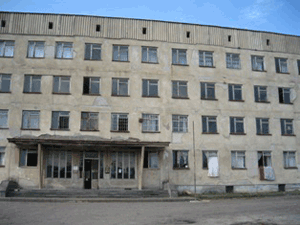 Shorena Kakabadze, Kutaisi
Shorena Kakabadze, Kutaisi
Those IDPs from collective centers now warehoused in the Imereti Region have addressed the Kutaisi Office of the Human Rights Centre about their immediate concerns. IDPs from Upper Abkhazia, (former Kodori Gorge) are now complaining about the acute and critical living conditions they face and see no improvement in sight of their plight. They have even applied to domestic NGOs and international organizations for possible assistance. The IDPs are saying that they have lost confidence in the local government a long time ago, and further explained that the conditions they are currently facing are utterly unbearable.
“The smell from the sewage system is killing us on top of all our other misfortunes. Nobody in positions of responsibility worries about us and they are now taking care of our immediate needs. To make matters worst, we are being poisoned by the foul smell. It is impossible to even wash our faces under such dire circumstances. However, we are adults and somehow we will endure this unbearable situation but what to do about the children. The situation totally torments them. We have applied to the local government numerous times but to no avail. Maybe you will be so kind to help us. We do not want to die in a virtual dump,” say IDPs who found shelter in Kutaisi Auto Mechanic College.
The IDPs say that their living conditions further deteriorate each passing day. There is no running water as well as no conditions for preparing food in the building where 20 IDP families are now warehoused. The families where little children are being brought up also have to undergo this situation and it is rather painful for them. This may be a public health crisis just waiting to explode, especially in light of the lack of water and overall conditions.
“IDPs should not have been moved in that building (Auto-Mechanic College), as to start with there are no conditions for human to live in Auto-Mechanic College building in the first place. It is inadmissible that one part was occupied by the IDPs and the other by an educational institution. It is easy to appreciate the overall situation for IDPs in Georgia is neither bad nor very good but still it must be remembered that they are still human beings. Things would have even been worst if it had not been for the NGOs and the provided humanitarian aid that was brought into Kutaisi in the very fist days of their arrival into the city. When the Kutaisi City Hall administration could not distribute several humanitarian cargos, it just sent the goods back. I think everything is said with this fact,” states Zurab Khurtsidze, the chairperson of the Association for Struggle against Corruption and Protection of Human Rights.
Davit Aptsiauri, head of Imereti Regional Division of the Ministry of Refugees and Accommodation of Georgia states that the IDPs themselves are responsible for the problem. “We offered them better conditions but received a firm refusal. We were planning to move these people to Samtredia, in the building that had better living conditions. However, they did not want to go to the region. We also offered Vartsikhe Presidential Residence for their lodging. Again, they refused the offer. Apparently, they want to live in Kutaisi. So let them live there as there is nothing that I can do about it – it is their decision. When representatives of Polish government arrive those IDPs complained to them that they had not received bread for the 3 days. In fact they received bread on daily basis. I can not make head or tail of these people and what motivates them – and what do they actually want,” states Aptsiauri, a governmental representative.
Similar to Auto-Mechanic College, the conditions in other IDP centers are also critical. The inhabitants of all seven Kutaisi collective centers complain about unbearable conditions they have to bear. However, in spite of all their pleas, representatives of the local government state that they are not in the position to repair the buildings IDPs live as they are only there because the IDPs live there temporarily.



